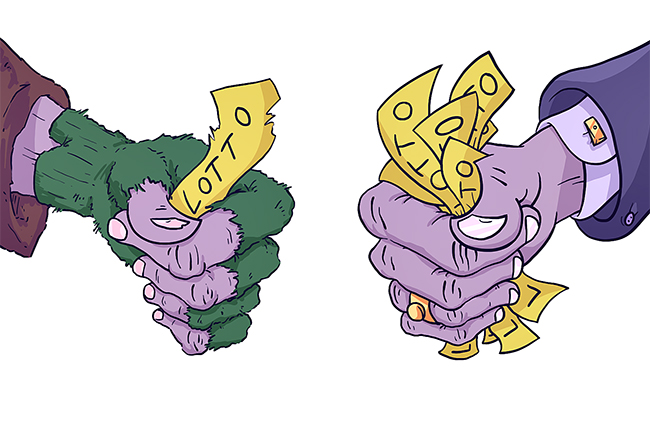After news broke of the $1.4 billion Powerball jackpot, thousands of people hoping to win shared a Facebook meme this past week claiming that by sharing the wealth of the winnings, they could easily solve poverty. Although winning the Powerball may seem great, the reality is that the lottery does more damage to the American people than good.
Most lottery systems operate under the guise that a percentage of the winnings go to funds for education. While this is undoubtedly a tax on gambling, it ultimately harms those that both play into the lottery and need its funds for schools. John Oliver talked about where money is generated from on HBO’s Last Week Tonight on July 13, 2014.
“Over the course of the last two decades, studies have found lower income households spend a higher percentage of their money on the lottery tickets,” Oliver said. “That kind of makes sense — lots of people like to gamble, and for lower income households, the lottery is an affordable way to do it.”
The problem with having a higher percentage of low income people pay into the lottery is that it ultimately leads to an unfair distribution of wealth. According to a study by the National Tax Journal, the lottery currently takes a disproportionate amount of money away from the working class and redistributes it unevenly back into the public school system. Few people benefit from this. A much better investment to our nation’s poorest schools would be to directly pay into the school system. However, the companies behind the lotteries run constant marketing campaigns claiming to help America’s school systems. This gives those who partake in the lottery a false sense of fulfilment for their investment.
One might think that there is some sort of benefit to the lottery. Every few months someone wins the jackpot, and in the process, millions of dollars go into public education. According to the Washington Post, instead of using the money as additional funding, legislatures from multiple states use lottery money to pay for the education budget and use money previously allocated for schooling elsewhere. Yet, there is no additional benefit to education with using lottery money, despite states’ claims.
Even with lottery money, the benefits have been declining yearly. In 1996, the lottery would have covered two weeks of schooling in Texas, but now, it barely covers three days of education per school. Texas House Representative Jim Dunnam (D-Waco) spoke to the Austin American-Statesman about the effects of the lottery on education.
“It’s a way to raise money where you don’t have to see the effects,” Dunnam said. “We’re funding our education programs on a population only driven by hopelessness. Schools are not better off because of the lottery.”
People have been too keen to participate in the lottery, especially when the Powerball rose to $1.4 billion. Unfortunately, few seem to understand the repercussions that are associated with the practice.
Americans from lower socioeconomic backgrounds become marginalized by participating in lotteries and are persuaded to do so through the guise of benefiting the American education system. The lottery needs reform so that it does not unnecessarily take money away from the people that need it the most.
Choudhury is an economics freshman from Dallas. He is a Senior Columnist. Follow him on Twitter @Mubarratc.





















